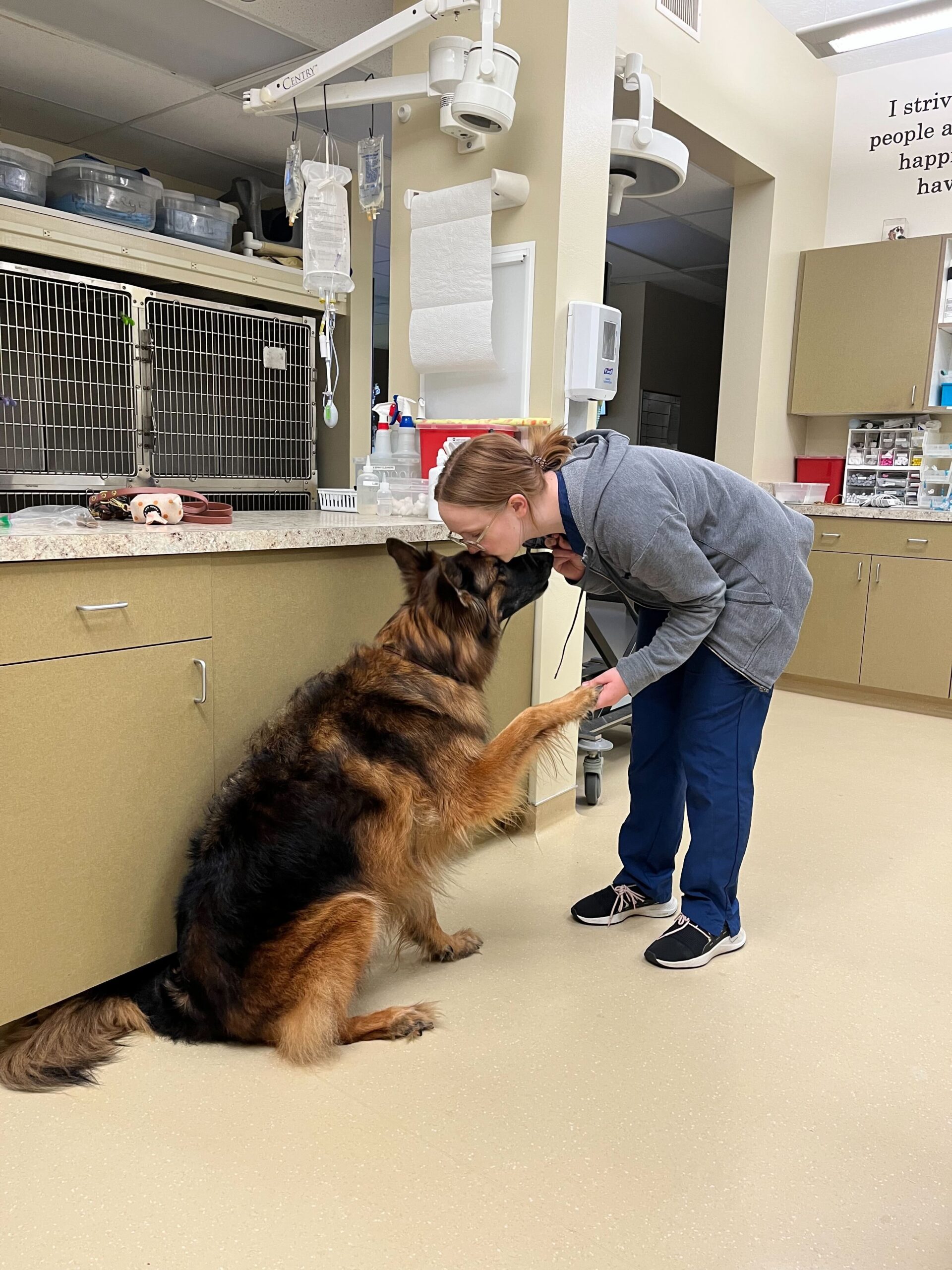Our incredible medical team is in this month’s spotlight as we observe National Vet Tech Week, a time to express our profound appreciation for the dedication of our licensed veterinary technicians and veterinary assistants.
Who Are They and What Do They Do?
Veterinary technicians are the unsung heroes of the animal healthcare world. They serve in a multitude of roles, from companion animal nursing to emergency and critical care, anesthesia and surgery, and even large animal and food animal medicine. In research laboratories, they work diligently to innovate technologies benefiting both humans and animals.

Veterinary Technician vs. Veterinary Assistant
While the titles “veterinary technician” and “veterinary assistant” are often used interchangeably, there are critical distinctions between them. Veterinary technicians undergo formal training programs, typically lasting two years. These programs equip them with an extensive knowledge base, covering biology, anatomy, physiology, pharmacology, and introductory medicine. In addition, they complete laboratory courses to acquire essential skills. After their program, they must pass the Veterinary Technician National Exam and a state licensing examination. Licensed veterinary technicians (LVTs) commit to annual continuing education and maintaining good standing with the veterinary board.
Conversely, veterinary assistants often enter the field without formal training, initially focusing on basic animal care tasks. Over time, those demonstrating aptitude and interest receive hands-on training, beginning with tasks like animal restraint, and gradually progressing to more complex patient care responsibilities.
It’s crucial to underscore that both veterinary technicians and assistants contribute substantially to the veterinary profession. They are the bedrock upon which the world of animal healthcare is built. While veterinary technicians bring a wealth of knowledge and formal education to the table, both technicians and assistants infuse their role with compassion and a penchant for learning.
Advancements in Veterinary Technology
The veterinary field has seen remarkable advancements over the years. While veterinary technician training programs were established in the 1960s, the ever-evolving complexity of veterinary medicine has driven the need for highly credentialed professionals capable of performing advanced procedures.
Today, specialized programs allow technicians to focus on subspecialties such as emergency and critical care, anesthesia and analgesia, dermatology, physical rehabilitation, nutrition, and more. Graduates of these programs earn the esteemed title of Veterinary Technician Specialist (VTS), often working in specialty or referral centers, industry, or educating the next generation of veterinary technicians.
The Role of Vet Techs at Agave Veterinary Care
At Agave Veterinary Care, our veterinary technicians and assistants are the backbone of our practice. They play a pivotal role in patient care, starting with a comprehensive review of medical records to assess vaccination schedules, diagnostics, and medication history. They engage with pet owners to gain insights into symptoms and environmental factors affecting the patient’s health.
Once the vet techs have a clear understanding of the patient’s needs, they provide cost estimates and, if necessary, work on alternate treatment plans that align with the family’s budget. This commitment to affordable and accessible care is at the heart of our mission.
Veterinary technicians also excel in obtaining samples, preparing laboratory specimens for analysis, and analyzing samples for infections or abnormalities. They meticulously record vital statistics and triage patients based on initial examinations, taking immediate action if a patient appears medically unstable.
Our vet techs are well-versed in vaccination recommendations, parasite prevention, and the handling and storage of vaccines. They ensure the comfort and safety of our patients through Fear Free techniques, combining gentle handling, positive reinforcement, and empathy.
These dedicated professionals possess expertise in pharmacology, guiding pet owners on medication administration and offering tips for a seamless experience. They meticulously document patient exams, recommendations, and home care instructions in electronic medical records and are readily available to answer follow-up calls from pet owners.
Furthermore, our veterinary technicians are skilled in performing a wide range of procedures, including IV catheter placement, fluid therapy, surgical preparation, anesthesia, and diagnostic imaging. They not only understand the animals in their care but also maintain and operate the equipment crucial to patient well-being.
In honor of Vet Tech Appreciation Week (October 15-21, 2023), we want to shine a spotlight on the unwavering dedication, compassion, knowledge, and expertise that our exceptional team brings to patient care. It’s a privilege to work alongside such remarkable professionals who consistently go above and beyond for our patients and their families.
If you happen to visit our office this month, we kindly ask you to take a moment to express your gratitude to our veterinary technicians and assistants. They are the true rock stars of Agave Veterinary Care, and their commitment to the well-being of your beloved pets is unwavering.
Thank you for joining us in celebrating the heroes behind the scenes who make our practice a place of compassion, expertise, and exceptional care.

